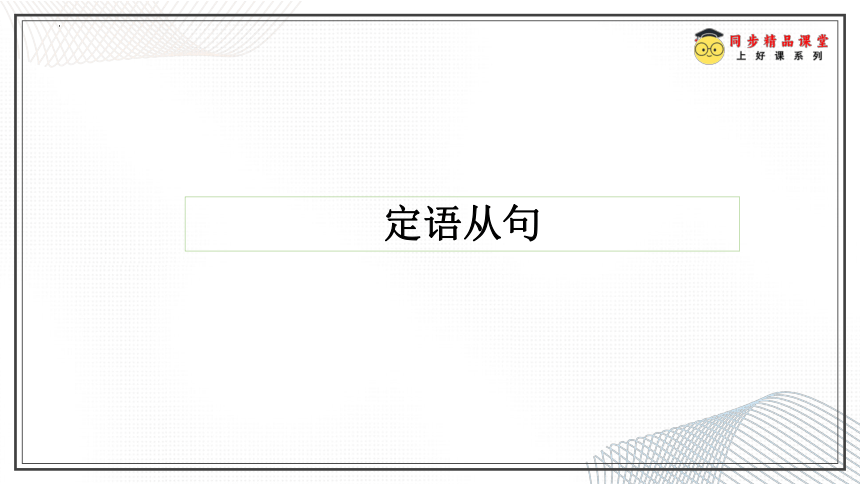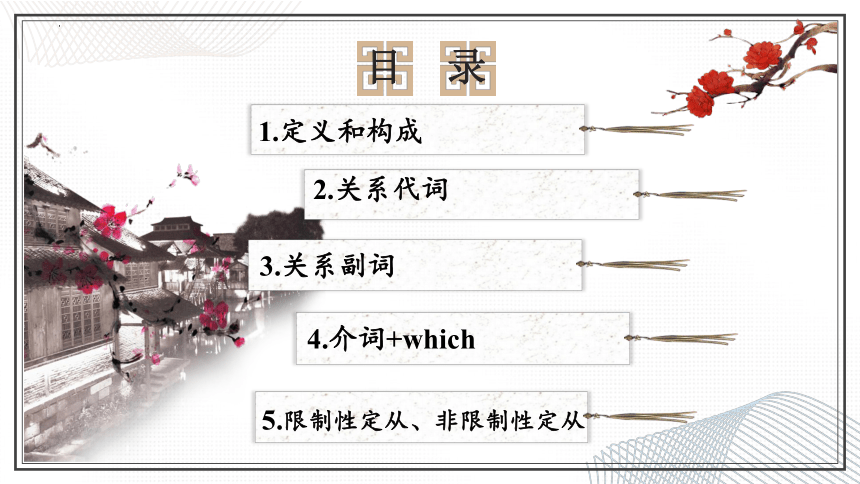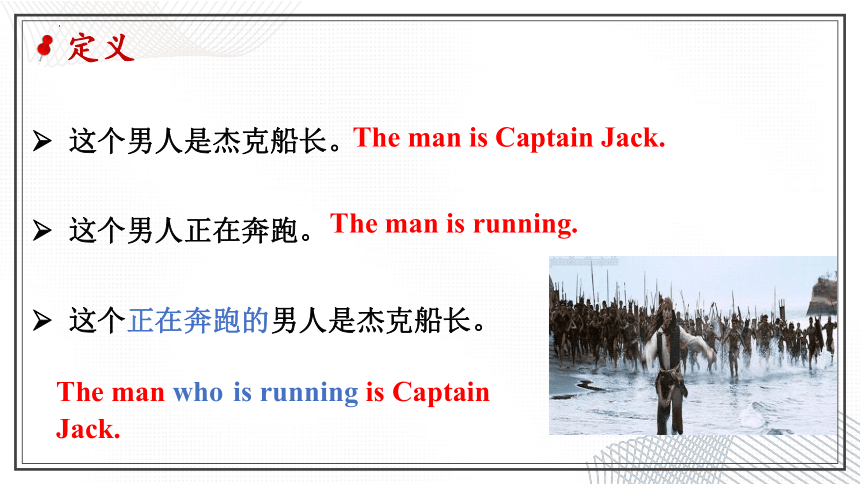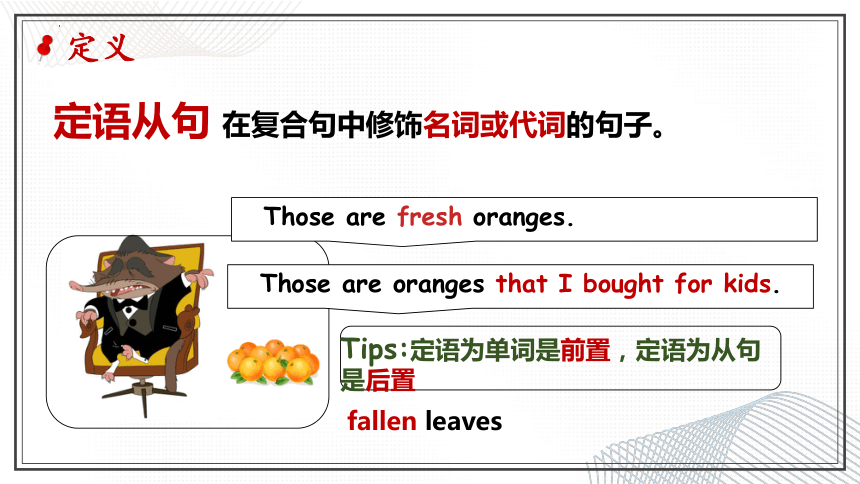2024年人教版九年级全册 Unit 9 I like music that I can dance to.语法 定语从句 课件(共28张PPT)
文档属性
| 名称 | 2024年人教版九年级全册 Unit 9 I like music that I can dance to.语法 定语从句 课件(共28张PPT) |

|
|
| 格式 | pptx | ||
| 文件大小 | 5.2MB | ||
| 资源类型 | 教案 | ||
| 版本资源 | 人教新目标(Go for it)版 | ||
| 科目 | 英语 | ||
| 更新时间 | 2024-11-01 00:00:00 | ||
图片预览









文档简介
(共28张PPT)
定语从句
目
录
3.关系副词
4.介词+which
2.关系代词
1.定义和构成
5.限制性定从、非限制性定从
1.定义和构成
定义
这个男人是杰克船长。
这个男人正在奔跑。
这个正在奔跑的男人是杰克船长。
The man is Captain Jack.
The man is running.
The man who is running is Captain Jack.
定义
定语从句 在复合句中修饰名词或代词的句子。
Those are oranges that I bought for kids.
Tips:定语为单词是前置,定语为从句是后置
Those are fresh oranges.
fallen leaves
构成
在主从复合句中,对某一名词或代词起修饰作用的从句叫定语从句。被修饰的名词或代词叫先行词,引导定语从句的连接词叫关系词(关系代词和关系副词)。定语从句一般位于先行词后。
The man who is running is Captain Jack.
先行词
关系代词
构成
定语从句的构成
“一个包含定语从句的复杂句”是由两个(或以上)简单句组合而成的。
The girl was in red.
The girl broke the glass.
The girl who was in red broke the glass.
关系代词的作用:
1.连接从句和主句
2.在从句中充当句子成分
3.代替先行词
2.关系代词
定语从句中的关系代词
注意:关系代词作宾语和省略
关系代词 修饰的先行词 在从句中所作的成分
that 人或物 主语,宾语,表语
which 物 主语,宾语,表语
who 人 主语,宾语
whom 人 宾语
whose 人或物 定语
as 人或物 主语,宾语,表语
做题方法
1.确定定语从句
2.找到先行词
3.将先行词代词从句,分析做何成分
4.根据成分,得出关系词
下列情况中,定语从句中关系代词一般用that而不用which:
先行词为all, everything, nothing, something, anything, little,
much 等不定代词时。
2. 先行词被all, every, no, some, any, little, much等修饰时。
3. 先行词被序数词或形容词最高级修饰时。
4. 先行词被the only, the very, the same, the last修饰时。
5. 先行词既有人又有物的时候,只能用that。
Attributive Clause :
as 引导限制性定语从句;先行词前有as ,such,the same,so修饰、
Such people______have made great contributions to the world should be greatly respected.
You may take as many chair_______you need.
My parents don’t have so money_______I want.
Attributive Clause :
注意:1.such/so...that...中that不做成分,只起引导作用
2.the same...that...指同一个
the same....as...不是同一个
3.关系副词
Attributive Clause :
1.This is the place_________we visited last time.
2.This is the place_________we visited the equitment last time.
3.I still remember the time_________we first met each other.
4.I still remember the time__________we spent together.
5.This is the reason__________she cried.
6.This is the reason__________she gave me.
定语从句中的关系副词
关系副词 修饰的先行词 在从句中所作的成分
where 地点名词(city,place,house,position等 地点状语
when 时间名词(time,day ,week 等) 时间状语
why 原因名词 reason 原因状语
I still remember the time when I first travelled by plane.
We will never forget the year when the 29th Olympic Games were held in Beijing.
They’ll never forget July 1 when Hong Kong returned to its motherland.
when 引导的定语从句修饰表示时间的名词, 如 time, morning, day, week, month, year, date, moment 等, 在定语从句中时间状语, 相当于“地点介词+ which”。
1. when
2. where
I'd like to live in the house where there is plenty of sunshine.
You could get into a situation where you have to decide immediately.
This is the factory where I worked ten years ago.
where 引导的定语从句修饰表示地点的名词, 在定语从句中作地点状语,相当于“地点介词 + which ”。
2. where
具体地点
Where引导定语从句的先行词一般是表示具体地点的名词,如place, room, house, school, building,factory等。
This is the school where I used to stay.
抽象地点
有的先行词不是具体的地点名词,而是抽象的地点名词,如:position (位置,境地), stage (阶段), situation (环境), case (情况), occasion (场合), activity, point (地步), spot (地点), atmosphere(氛围)等。
The spot where the accident happened is the turning point of the road.
It's put me in a position where I can't afford to take the job.
3. why
I don't know the reason why he didn't turn to his good friend for help yesterday.
Can you tell me the reason why you didn't come to his birthday party
There are many reasons why people like traveling.
why引导的定语从句修饰先行词 reason, 在从句中作原因状语, 相当于“for + which”。
Practising :
①I will never forget the days ________ we spent together.
②I will never forget the days ______ we stayed together.
③The reason ______ he explained at the meeting was not sound.
④The reason ______he was late was that he missed his train.
⑤Keep the book in a place _______you can find it easily.
⑥This is the house _______ was built by my grandfather forty years ago.
4.介词+关系代词
1.when、 where、 why可以由介词+which代替
2.介词的选择
①根据先行词固定搭配
This is the camera ________ he often takes photos.
I‘ll never forget the day_______ I joined the army.
②根据从句动词或者形容词的搭配
Is this the car________you paid a high price
He brought the result________the boss was satisfied.
介词+关系代词
1.介词+which/whom
(with the camera“用照相机”)
(on the day“在那一天”)
pay...for....为...花费...
be satisfied with...对...满意
③根据从句要表达的意思
He is swimming in the river_______there is a boat.
This is the pilot______my son was saved.
3.先行词是人用介词+whom
先行词是物用介词+which
This is the student___________I bought a book.
介词+关系代词
1.介词+which/whom
注意:在定语从句中,有一些含介词的短语动词不可拆开,如look after、look for 等
不能把介词移至which或whom之前。
The babies whom the nurses are looking after are very healthy. (√)
The babies after whom the nurses are looking are very healthy. (×)
①I like the girl is black and long.
②I like the book is beautiful.
介词+关系代词
2.whose=of which/whom
女孩儿的头发
1.the girl’s hair
2.the hair of the girl
书的封皮
1.the book’s cover
2.the cover of the book
whose hair
,the hair of whom
,of whom the hair
whose cover
,the cover of which
,of which the cover
_________hair
______cover
She has three sons,one of whom is a doctor.
She has three sons,all of whom are handsome.
She has three sons,the oldest of whom is called Mary.
介词+关系代词
3.of+which/whom表示部分与整体的关系
1.介词+which/whom
2.whose =of+which/whom
3.of which/whom表示部分语整体的关系
介词+关系代词
5.限制性和非限制性
定从
区别
1.I like girls who are beautiful.
2.This is my friend Lily,who is a good girl.
非限制性定从
1.不用that,why
2.从句前有逗号
1.意思:which这件事 as 正如
2.位置:which放主句后 as任意
3.时间:which分先后(主句先发生,从句后评价)
as不分先后,把主句当做事实
1._________we all know ,the earth is round.
2.They found the murder,__________surprised me.
which和as 的区别
Thank You !
定语从句
目
录
3.关系副词
4.介词+which
2.关系代词
1.定义和构成
5.限制性定从、非限制性定从
1.定义和构成
定义
这个男人是杰克船长。
这个男人正在奔跑。
这个正在奔跑的男人是杰克船长。
The man is Captain Jack.
The man is running.
The man who is running is Captain Jack.
定义
定语从句 在复合句中修饰名词或代词的句子。
Those are oranges that I bought for kids.
Tips:定语为单词是前置,定语为从句是后置
Those are fresh oranges.
fallen leaves
构成
在主从复合句中,对某一名词或代词起修饰作用的从句叫定语从句。被修饰的名词或代词叫先行词,引导定语从句的连接词叫关系词(关系代词和关系副词)。定语从句一般位于先行词后。
The man who is running is Captain Jack.
先行词
关系代词
构成
定语从句的构成
“一个包含定语从句的复杂句”是由两个(或以上)简单句组合而成的。
The girl was in red.
The girl broke the glass.
The girl who was in red broke the glass.
关系代词的作用:
1.连接从句和主句
2.在从句中充当句子成分
3.代替先行词
2.关系代词
定语从句中的关系代词
注意:关系代词作宾语和省略
关系代词 修饰的先行词 在从句中所作的成分
that 人或物 主语,宾语,表语
which 物 主语,宾语,表语
who 人 主语,宾语
whom 人 宾语
whose 人或物 定语
as 人或物 主语,宾语,表语
做题方法
1.确定定语从句
2.找到先行词
3.将先行词代词从句,分析做何成分
4.根据成分,得出关系词
下列情况中,定语从句中关系代词一般用that而不用which:
先行词为all, everything, nothing, something, anything, little,
much 等不定代词时。
2. 先行词被all, every, no, some, any, little, much等修饰时。
3. 先行词被序数词或形容词最高级修饰时。
4. 先行词被the only, the very, the same, the last修饰时。
5. 先行词既有人又有物的时候,只能用that。
Attributive Clause :
as 引导限制性定语从句;先行词前有as ,such,the same,so修饰、
Such people______have made great contributions to the world should be greatly respected.
You may take as many chair_______you need.
My parents don’t have so money_______I want.
Attributive Clause :
注意:1.such/so...that...中that不做成分,只起引导作用
2.the same...that...指同一个
the same....as...不是同一个
3.关系副词
Attributive Clause :
1.This is the place_________we visited last time.
2.This is the place_________we visited the equitment last time.
3.I still remember the time_________we first met each other.
4.I still remember the time__________we spent together.
5.This is the reason__________she cried.
6.This is the reason__________she gave me.
定语从句中的关系副词
关系副词 修饰的先行词 在从句中所作的成分
where 地点名词(city,place,house,position等 地点状语
when 时间名词(time,day ,week 等) 时间状语
why 原因名词 reason 原因状语
I still remember the time when I first travelled by plane.
We will never forget the year when the 29th Olympic Games were held in Beijing.
They’ll never forget July 1 when Hong Kong returned to its motherland.
when 引导的定语从句修饰表示时间的名词, 如 time, morning, day, week, month, year, date, moment 等, 在定语从句中时间状语, 相当于“地点介词+ which”。
1. when
2. where
I'd like to live in the house where there is plenty of sunshine.
You could get into a situation where you have to decide immediately.
This is the factory where I worked ten years ago.
where 引导的定语从句修饰表示地点的名词, 在定语从句中作地点状语,相当于“地点介词 + which ”。
2. where
具体地点
Where引导定语从句的先行词一般是表示具体地点的名词,如place, room, house, school, building,factory等。
This is the school where I used to stay.
抽象地点
有的先行词不是具体的地点名词,而是抽象的地点名词,如:position (位置,境地), stage (阶段), situation (环境), case (情况), occasion (场合), activity, point (地步), spot (地点), atmosphere(氛围)等。
The spot where the accident happened is the turning point of the road.
It's put me in a position where I can't afford to take the job.
3. why
I don't know the reason why he didn't turn to his good friend for help yesterday.
Can you tell me the reason why you didn't come to his birthday party
There are many reasons why people like traveling.
why引导的定语从句修饰先行词 reason, 在从句中作原因状语, 相当于“for + which”。
Practising :
①I will never forget the days ________ we spent together.
②I will never forget the days ______ we stayed together.
③The reason ______ he explained at the meeting was not sound.
④The reason ______he was late was that he missed his train.
⑤Keep the book in a place _______you can find it easily.
⑥This is the house _______ was built by my grandfather forty years ago.
4.介词+关系代词
1.when、 where、 why可以由介词+which代替
2.介词的选择
①根据先行词固定搭配
This is the camera ________ he often takes photos.
I‘ll never forget the day_______ I joined the army.
②根据从句动词或者形容词的搭配
Is this the car________you paid a high price
He brought the result________the boss was satisfied.
介词+关系代词
1.介词+which/whom
(with the camera“用照相机”)
(on the day“在那一天”)
pay...for....为...花费...
be satisfied with...对...满意
③根据从句要表达的意思
He is swimming in the river_______there is a boat.
This is the pilot______my son was saved.
3.先行词是人用介词+whom
先行词是物用介词+which
This is the student___________I bought a book.
介词+关系代词
1.介词+which/whom
注意:在定语从句中,有一些含介词的短语动词不可拆开,如look after、look for 等
不能把介词移至which或whom之前。
The babies whom the nurses are looking after are very healthy. (√)
The babies after whom the nurses are looking are very healthy. (×)
①I like the girl is black and long.
②I like the book is beautiful.
介词+关系代词
2.whose=of which/whom
女孩儿的头发
1.the girl’s hair
2.the hair of the girl
书的封皮
1.the book’s cover
2.the cover of the book
whose hair
,the hair of whom
,of whom the hair
whose cover
,the cover of which
,of which the cover
_________hair
______cover
She has three sons,one of whom is a doctor.
She has three sons,all of whom are handsome.
She has three sons,the oldest of whom is called Mary.
介词+关系代词
3.of+which/whom表示部分与整体的关系
1.介词+which/whom
2.whose =of+which/whom
3.of which/whom表示部分语整体的关系
介词+关系代词
5.限制性和非限制性
定从
区别
1.I like girls who are beautiful.
2.This is my friend Lily,who is a good girl.
非限制性定从
1.不用that,why
2.从句前有逗号
1.意思:which这件事 as 正如
2.位置:which放主句后 as任意
3.时间:which分先后(主句先发生,从句后评价)
as不分先后,把主句当做事实
1._________we all know ,the earth is round.
2.They found the murder,__________surprised me.
which和as 的区别
Thank You !
同课章节目录
- Unit 1 How can we become good learners.
- Section A
- Section B
- Unit 2 I think that mooncakes are delicious!
- Section A
- Section B
- Unit 3 Could you please tell me where the restroom
- Section A
- Section B
- Unit 4 I used to be afraid of the dark.
- Section A
- Section B
- Unit 5 What are the shirts made of?
- Section A
- Section B
- Review of Units 1-5
- Unit 6 When was it invented?
- Section A
- Section B
- Unit 7 Teenagers should be allowed to choose their
- Section A
- Section B
- Unit 8 It must belong to Carla.
- Section A
- Section B
- Unit 9 I like music that I can dance to.
- Section A
- Section B
- Unit 10 You're supposed to shake hands.
- Section A
- Section B
- Review of Units 6-10
- Unit 11 Sad movies make me cry.
- Section A
- Section B
- Unit 12 Life is full of the unexpected
- Section A
- Section B
- Unit 13 We're trying to save the earth!
- Section A
- Section B
- Unit 14 I remember meeting all of you in Grade 7.
- Section A
- Section B
- Review of Units 11-14
